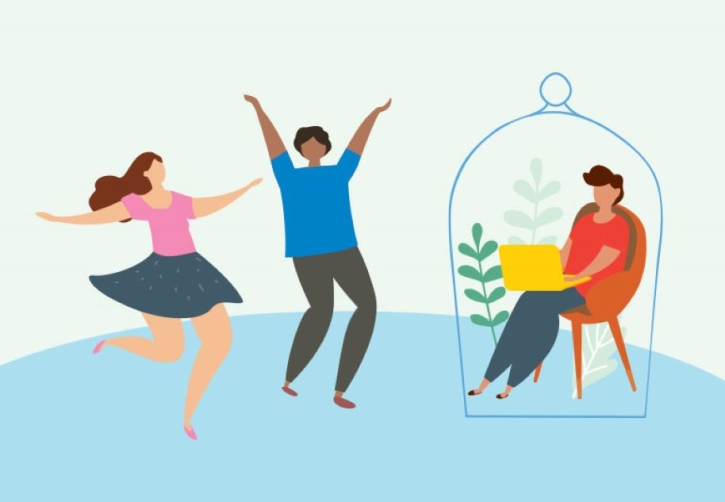A leader should know why businesses need both extroverts and introverts
BI Feature || BusinessInsider

Representational image. Collected illustration.
Personality was originally derived from the Latin word ''charm''. "Charm" brought some meaning namely face cover, person with masks which produce differences. This definition describes
the external appearance highlighted by an individual. According to psychologists, personality covers aspects such as motivation, individual intelligence, how individuals think, their opinions
regarding things and values they hold. The concept of personality is a dynamic organization of psychophysical system where the system determines a person's thinking and his behavior. There are many personality traits like aggressive, introverted, extroverted, analytical, and intellectually diversified.
The introverts tend to have a more developed prefrontal cortex, an area of the brain associated with deep thinking and abstract thought. In contrast, the prefrontal cortexes of extroverts were less thick and developed, which indicates a difference in the way they use their minds. There is a fair amount of evidence that introverts and extroverts think differently. This difference may be due to structural differences in the brain as well as to differences in personality and personal preferences. The words introvert and extroverts are labels, and there are always problems with labels. They have the effect of trapping people into behavioral and personal expectations that can be detrimental to their growth and functioning. However, if the leader used correctly, they can also be helpful. For example, these labels don’t necessarily refer to strict behavioral rules. Instead, they’re about the energy guidelines and focus of the individuals. In short, both types of thinkers are absolutely essential to the effective functioning of a business. The difference between introverts and extroverts in this case may be due to differences in the way their brains react to dopamine. The understanding of the of this difference can be of great benefit. Instead of trying to push against this natural proclivity, an introvert who finds the public aspects tiresome could consciously choose to team up with an extrovert. There have been some great examples of how this strategy can pay off, such as in various partnerships. This idea can also work on a smaller scale, and often the partnership between an introvert and an extrovert is the most natural and effective way to get work done well.
Individual unique character with their own distinctive personality: Implicit interrelations among noticeable behaviors, internal dispositions and preferences do act. These alliances portray the individual’s unchanging patterns of behavior and describe dissimilarities between people rather than within individuals. This in turn may be at the head of the various types of sense, line of thought, and behavior in dissimilar ways and among different people. Furthermore, personality can be defined in two different ways: 1) characterization and individuality, or as 2) the subjective structure that brings out the characteristics of a person. Extroversion is the dimension where a person has a fundamental need to project a strong self-image for self-esteem and a sense of completeness from others. Introversion is the extent to which a person can derive a sense of wholeness and fulfillment on their own without reflection of themselves from other people.
Extroversion/Introversion and Anxiety: Explains that extroverts are less sensitive to punishment signals, so, their insensitivity and their under-arousal condition make them to be more stress-resident while introverts who have a higher level of neurotransmitter dopamine. Dopamine plays the important role of controlling movements or the ability to move, learning, working memory, cognition, and emotion. Introverts already have a higher level of dopamine, so they require less to not be very high or very low in order to make them relaxed without stress or depression. Some psychologists believe that impulsive individuals are freer and do better under highly stressful circumstances. However, extroverts act more quickly but less correctly when doing compound
cognitive tasks, while introverts perhaps are slower but are more precise. Introverts’ apprehension of punishment makes them more cautious to act more carefully. Therefore, they are more likely to be more precise when using linguistic forms.
Personality and language: Personality and language have always sparks some interest among researchers. Many studies have been conducted and researchers have found many different aspects of personality and its influence in writing. To understand the impact of personality, one needs to know how personality differences manifest themselves in language use. Results showed significant positive correlations between extraversion and both language abstraction and self-reported level of interpretation. The overall findings suggest that the verbal style of extraverts is characterized by a higher level of abstract interpretation, whereas introverts tend to stick to concrete facts. Although this study focus more on the language use in speaking skill, it gives some insight what kind of words that these two personalities tend to use.
Why needs both introverts and extroverts: Both extroverts and introverts have skills that are necessary to the world. This simple fact makes the debate over which personality type is better completely irrelevant in business, and in life in general. No matter which personality type you are, you need to learn to harness your natural abilities to improve your work and your life as a whole. As the leader, his or her goal is to have all the employees operating at their peak level of energy, efficiency, and with motivation—which can be a challenge when it comes to leading a team comprised of introverts and extroverts. Leader should capable to manage these vastly different personalities and work preferences and to draw out introverts and get extroverts to listen. Ultimate goal to follow the best way to adapt management style so that it works for everyone. Dominance complementarity i.e. the tendency of groups to be more cohesive and effective when they have a balance of dominant and submissive members. It is easy to get caught up in the introvert vs. extrovert dichotomy, but personality traits live on a continuum. Human behavior is fluid and can be highly dependent on the situation. Yet, personality categories help us make sense of who we are and in turn help us navigate the social environments that strongly bind us together. By finding the balance between action and reflection, we better serve ourselves and each other. This not only has tangible implications for the workplace but also society.
What steps are necessary from the organisational leader/employer: It is not necessary to figure out who’s an extrovert or introvert because in most cases some introverts are not immediately identifiable as they seem acting like extroverts. In other words, they appear sociable and outgoing at work, but as soon as they get home, they collapse on the couch from exhaustion. To get a handle the colleagues’ preferences, it should encourage frank and open conversations with people as individuals and as a team. It should talk to the team, too, about the ways in which personality differences drive performance. After all, a properly balanced team has the strengths and skills of both personality sets, whereas a team of too many extroverts can suffer from ego issues, while a team of too many introverts can be lacking a shared team dynamic. Necessary doable to balance social spaces with private ones, send the meeting agenda in advance and occasionally ask for written feedback to give introverts time to formulate their thoughts and summon the courage to share them, allow people to work the way they want to. Meanwhile, extroverts do feel comfortable taking time to socialize, while introverts should have license to work remotely or take breaks from the team. And things don’t assume you already know everything about introversion and extroversion, make an effort to learn about how personality impacts work preferences and styles, overload your team with meetings and give colleagues ample uninterrupted work time during the day, let a certain dominant personality do all the talking; encourage that person to reflect and listen. However, the leader should focus talks to the team members about how they prefer to work and learn, provide structure and encourage feedback in multiple formats. Differing personality styles and subsequent tensions will be present in every workplace. While personality style differences are sometimes given too much significance, understanding and acknowledging differing preferences in the workplace will contribute to organization success. It is important to remember available information on personality styles is generalization and will never fully describe a unique individual. Leaders may take steps to ease workplace tensions created by personality style differences and support individual employees in performing to their full potential. Further, it is needed to support common themes in popular culture and to assist organisations in shifting through the plethora of personality style information to determine what is truly valid and useful.
























